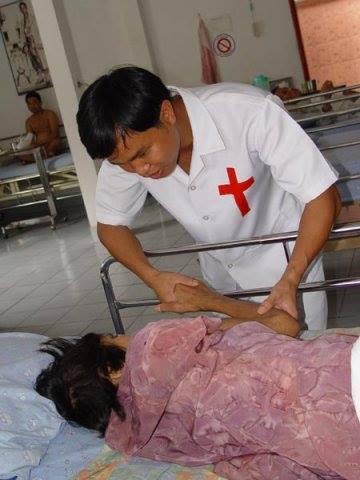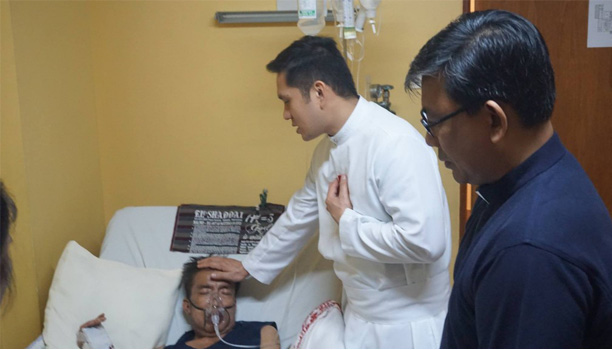 In addition to the celebration of the Eucharist in people’s homes and gestures of daily charity, a parish is invited to rediscover, through the initiative of parish priests, especially if they are Camillians, the value, the meaning and the urgent need to give to the sick the sacrament of holy anointing – which Jesus wanted for the overall healing of a person – specifically during a time of illness and suffering. Indeed, this sacrament which during the first nine centuries of the history of the Church was given abundantly by priests, deacons and the ordinary faithful (as takes place today with the extraordinary ministers of the Eucharist) to sick people without there being any connotation of a grave situation,(1) must go back to being requested and desired with joy in moments of pain, specifically when a man is sick but not dying, when the encounter with Christ can unleash all of its beneficial effects of salvation, relief and health. Indeed, the oil, which became a sacrament by the express wish of Jesus, nourishes, warms, raises up, and relieves the tiredness, depression and anxiety of the sick person and restores him safe and sound to the Christian community so that he can return to his usual affairs. Indeed, all of this is asked of the Lord during the ministration of the sacrament of the sick. If, instead, the illness is serious, grave or irreversible, then the encounter with Jesus with oil will sweeten the bitterness and the burden of the pain and the cross; will confer upon the sick person strength and energy to react to the temptation of despair; and will make him able to suffer like Christ with serenity and courage and even to offer up his pain for the salvation of the world, also preparing him to face up in a serene way to the event of death.
In addition to the celebration of the Eucharist in people’s homes and gestures of daily charity, a parish is invited to rediscover, through the initiative of parish priests, especially if they are Camillians, the value, the meaning and the urgent need to give to the sick the sacrament of holy anointing – which Jesus wanted for the overall healing of a person – specifically during a time of illness and suffering. Indeed, this sacrament which during the first nine centuries of the history of the Church was given abundantly by priests, deacons and the ordinary faithful (as takes place today with the extraordinary ministers of the Eucharist) to sick people without there being any connotation of a grave situation,(1) must go back to being requested and desired with joy in moments of pain, specifically when a man is sick but not dying, when the encounter with Christ can unleash all of its beneficial effects of salvation, relief and health. Indeed, the oil, which became a sacrament by the express wish of Jesus, nourishes, warms, raises up, and relieves the tiredness, depression and anxiety of the sick person and restores him safe and sound to the Christian community so that he can return to his usual affairs. Indeed, all of this is asked of the Lord during the ministration of the sacrament of the sick. If, instead, the illness is serious, grave or irreversible, then the encounter with Jesus with oil will sweeten the bitterness and the burden of the pain and the cross; will confer upon the sick person strength and energy to react to the temptation of despair; and will make him able to suffer like Christ with serenity and courage and even to offer up his pain for the salvation of the world, also preparing him to face up in a serene way to the event of death.
Thus a radical change of mentality is required both in priests and in the faithful, a new vision of the sacrament that the Second Vatican Council – after ten centuries of obscurantism and fear because it had been reduced to being the extreme unction – gave back to the Church of the Third Millennium as a medicine for overall healing to those who suffer in body and spirit, as long, however, as it is ministered to the sick and not to the dying. Indeed, for these last it is advisable to give the holy viaticum which should accompany them on their journey towards eternal life. Indeed, the exegesis of the same Biblical text on which this sacrament is based speaks explicitly about a sick person who personally calls the presbyters of the church who will rub ‘olive oil on them in the name of the Lord. The prayer made in faith will heal the sick; the Lord will restore them to health, and the sins they have committed will be forgiven (cf. Js 5:14-15).
Given this to be hoped-for conversion of hearts and minds in relation to this sacrament, I am therefore frightened by those priests (I hope they are not Camillians) who, on the one hand, have become very expansive and tolerant in offering the Sunday Eucharist to a multitude of the faithful who in a procession draw near to the altar (even though they are aware that they have not gone to confession for months and often even for years), but, on the other, are enormously zealous, severe, rigid and scrupulous in analysing, exploring and measuring the gravity of an illness and ascertaining whether the sick person has gone to confession and whether he can be listed amongst those who are predestined to receive the sacrament of the sick. I have exaggerated somewhat, but not that much! I would like, therefore, with Christian charity, to declare to these brothers of mine of the priesthood, and this is even more the case if they are Camillians, that one cannot have double standards with these two sacraments, and that above all else one cannot act cruelly towards sick people who are the weakest and the most defenceless and who were the ones most loved by Jesus. I would like, instead, to exhort them to be profuse specifically with this sacrament, in order to give it with joy to all those sick people who ask for it, without any connotation of a grave situation, as is confirmed by the long tradition of the Church and the exegesis of the Biblical text itself. Observing, again, that if this sacrament is received with faith and love by a sick person it also has a penitential effect: ‘the sins they have committed’, writes St. James, ‘will be forgiven’. The priest prays to the Lord that the sick person, healed by the sacrament, may ‘return to his usual affairs’.















Camillians on Facebook
Camillians on Twitter
Camillians on Instagram